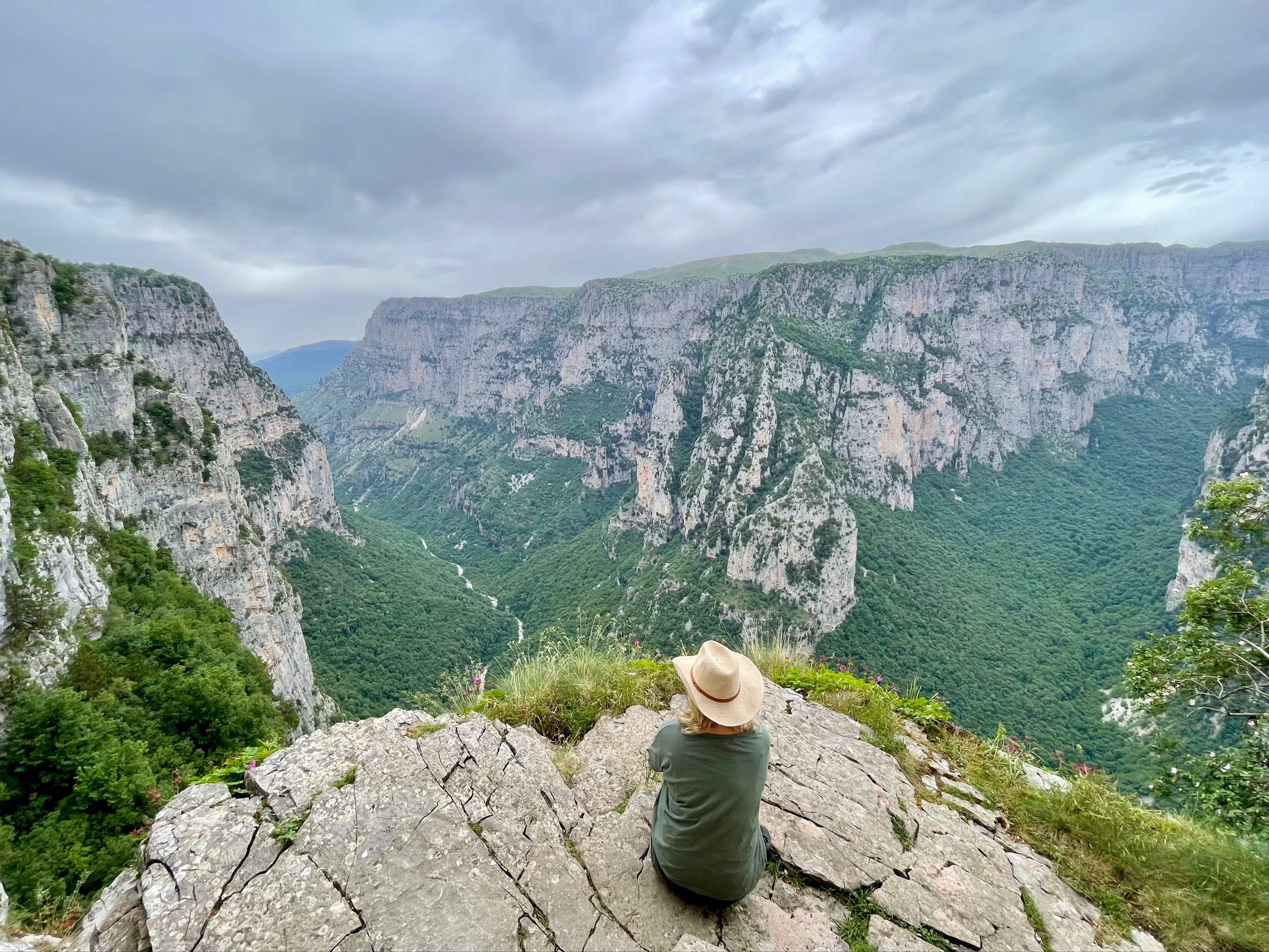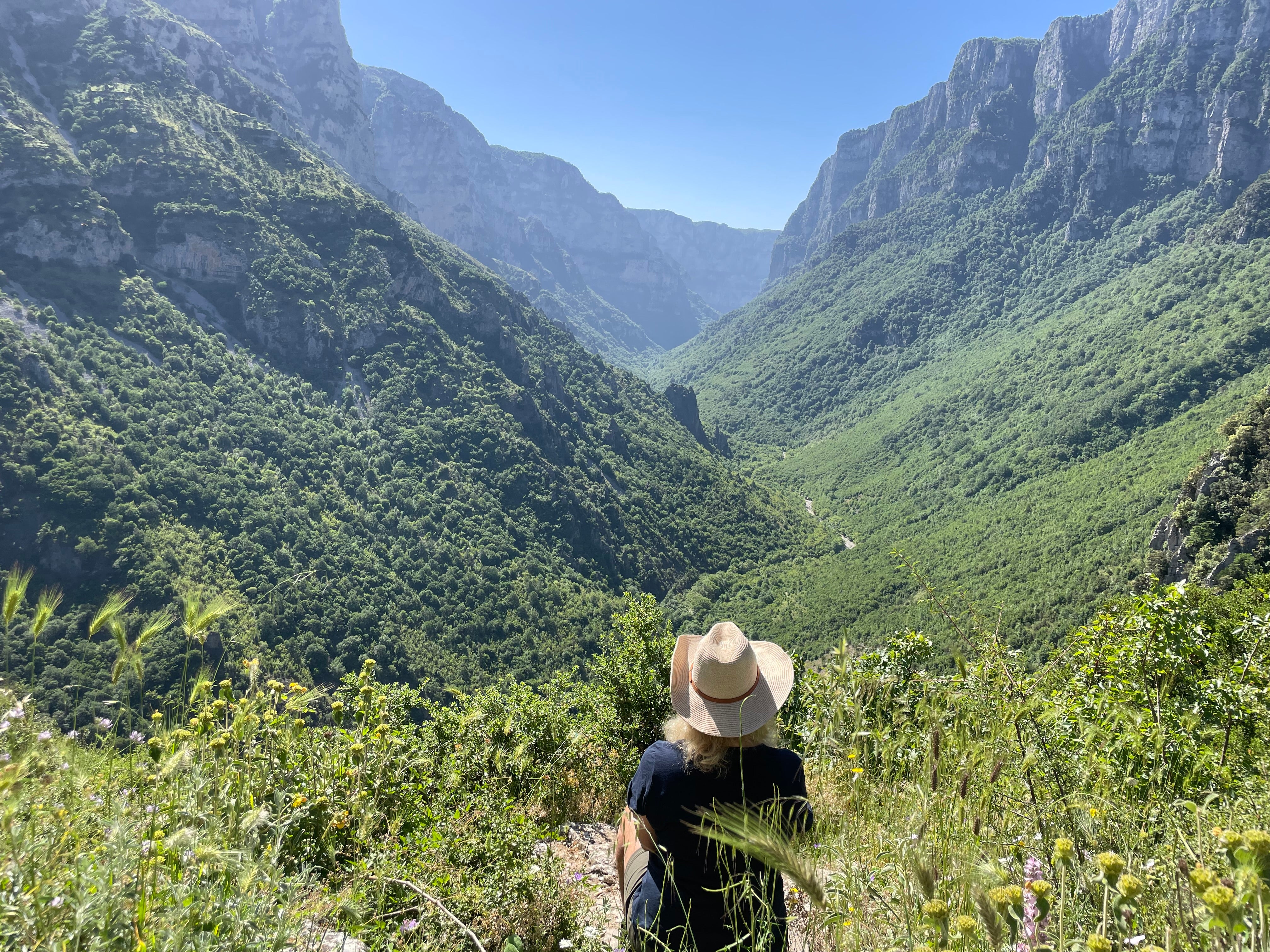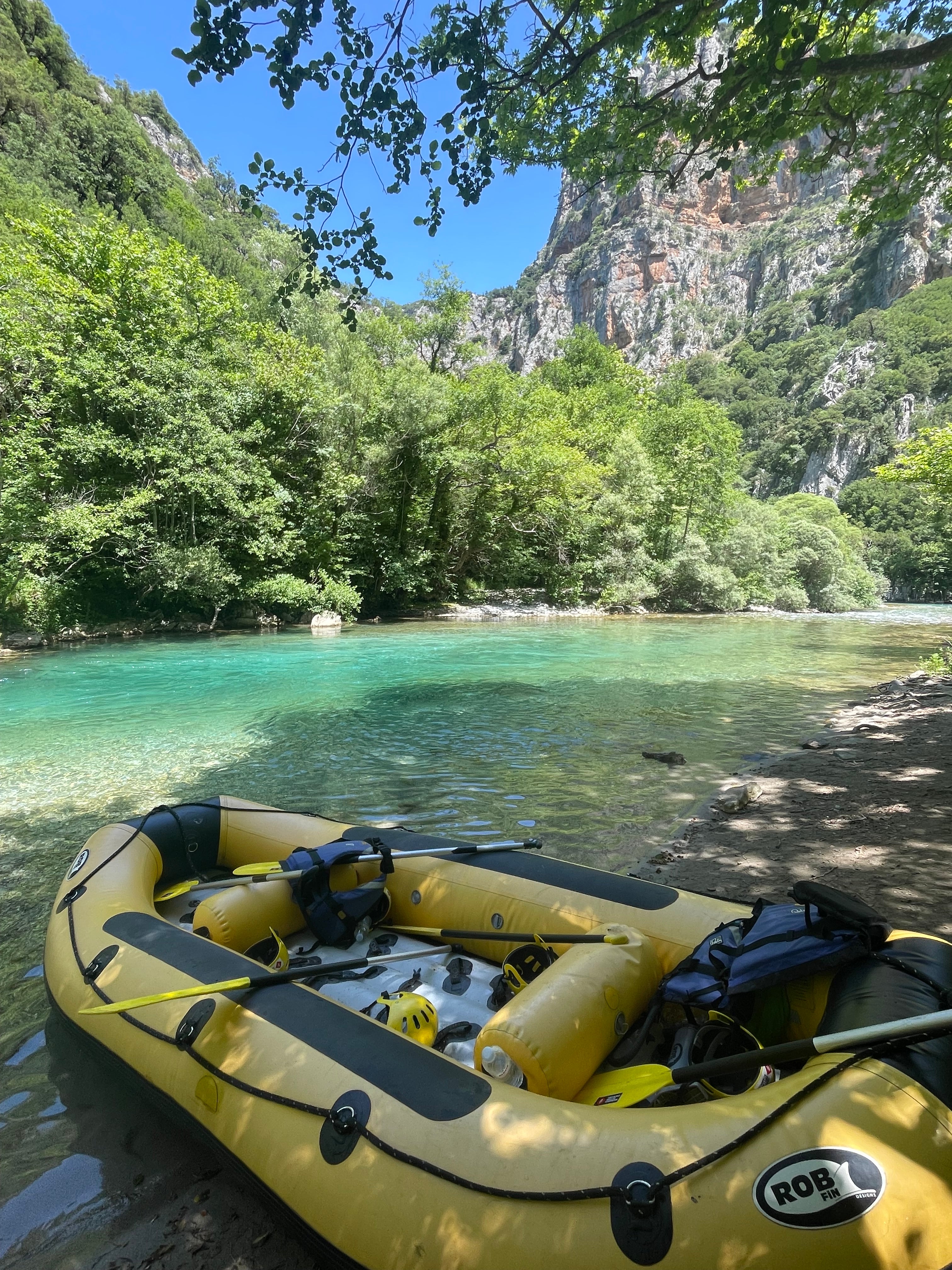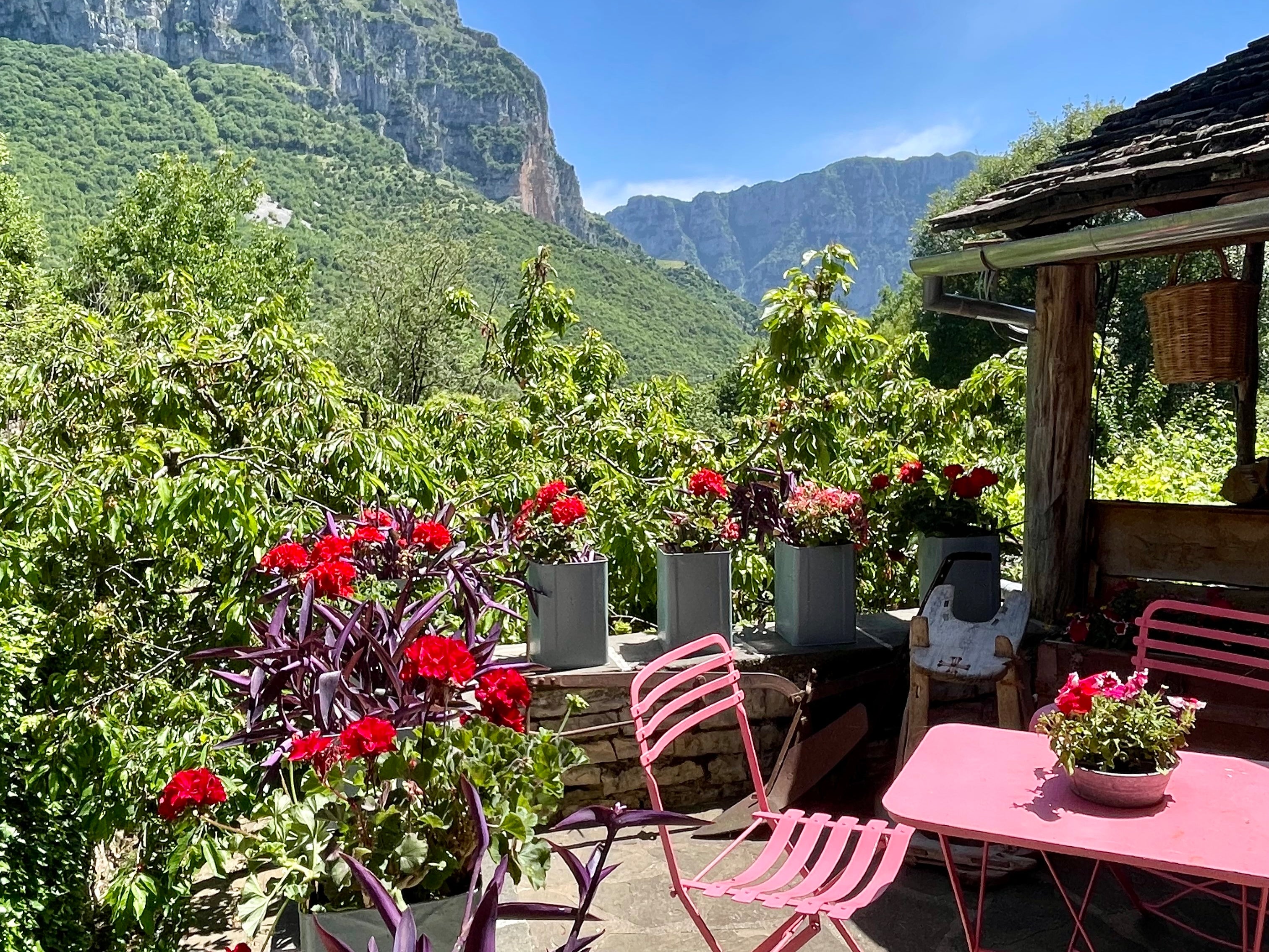The best way to do Greece this autumn – visit this Unesco-listed hidden treasure
If the summer is about sailing around the islands, Fiona McIntosh says the autumn should be about hiking pristine mountains and taking in the awesome views, waters and cuisine of Greece’s Zagori National Park

This is what we call rafting therapy,” says our guide Spyndoula, as we snake our way through the sheer-drop walls of the Vikos Gorge, oars rhythmically stroking the water.
Luminescent dragonflies buzz around us. Golden falcons circle above, and in the woods beyond roam wolves, elk, chamois, skunks, foxes, wild boar and bears.
Backlit by limestone, the river we are gliding along is the colour of a Maldivian beach. Yet this unexpectedly breathtaking wilderness is just a shorthaul flight from London, tucked away in remote northwest Greece.
The Zagori National Park was granted Unesco World Heritage status in 2023, and when you visit, you can’t quite believe it has taken this long. It’s the sort of place you come to for a complete reset in nature – you are swamped by the kind of untouched wilderness you didn’t know still existed in Europe.
Within the 390 square mile geopark, bordering Albania, the only signs of civilisation are ancient stone bridges left behind by the Ottomans and 46 villages, which are little more than small clusters of stone cottages. Some are so tiny that in winter, when they are uninhabited, bears break into the general store to steal the honey. It’s that kind of place.
Thankfully, there are no swaggering hotels or bling developments. Instead we stay in a hamlet of stone cottages that have been sensitively transformed into a boutique hotel, the Aristi Mountain Resort and Spa. From the moment you arrive and are handed a shot of the nasal-clearing local liquor tsipouro, you are immersed in a very different kind of Greece from the one you see while visiting the hedonistic islands.

It's a low-key, sophisticated, walking-boots-at-breakfast kind of place, with restaurant Salvia serving delicious modern riffs on traditional Greek mountain food, rich with local staples such as mushrooms, hearty lamb, yoghurt, and a panoply of herbs and vegetables plucked from the hotel’s organic farm. But what you really aren’t prepared for are the extraordinary film-set vistas, from sweeping views across the dramatic Vikos Gorge when you throw open your balcony doors in the morning, to rosy-pink rock faces from the terrace at sunset.
Read more: This region of Greece is beautiful, crowd-free and a Unesco site
It is impossible to come here and resist the siren call of the mountains. Thankfully, a guide can be booked to take you along one of the walking trails. There are around 100km (62 miles) of these routes, and they range from two-hour gentle river hikes to epic all-day treks to the Dragon Lake of Tymfi, which sounds (and looks) like something from Game of Thrones.
We manage a short hike through sun-dappled forests before clambering into an inflatable raft for a bumpy swoop down grade II rapids with our guide Spyndoula at the helm. Later that day, she takes us along a heart-poundingly narrow cliff path to the lip of the Vikos Gorge, which plunges 3,000ft beneath us.

That evening, as we bob around in the pool back at Aristi, we’re still reeling from the beauty of Zagori. Why didn’t we know about it before – and why are there so few Brits here? For most of us, Greece is still synonymous with lounge-lizarding on the islands. But on your next Grecian odyssey, I urge you to make a detour north to feed your soul for a different, autumnal experience.
What to do
The area is a total outdoor playground. You can hike (at any level) along well-marked paths, on your own or with a guide. We found a guide really helpful in creating a bespoke itinerary so we could work in as much as possible, from rafting breaks to mountain restaurant stops.
Other activities include kayaking, tubing, canyoning, paragliding, rock climbing, fishing, e-biking and even cross-country skiing in winter.
Where to eat
The food was excellent everywhere we ate, helped by the fact that this ecosystem provides an abundance of natural, organic produce. The menus are rich with market garden vegetables, mushrooms, yoghurts, lamb, chickpeas and slow-cooked goat stews. Here are some of the best:

This impossibly pretty organic farm in the village of Papigo has a restaurant sprawled under grape vines, where owner Kostas uses his farm produce to create Greek mountain classics and liquors made from fermented fruits and herbs. Make a day of it and walk up to picturesque Makro Papigo, then swim in limestone rock pools at the foot of the village.
Restaurateur and environmental scientist Vasilis specialises in mushrooms at his rustic restaurant in the village of Vitsa, including butter-soft grilled shiitake mushrooms and candied chanterelles served with Greek yoghurt, semifreddo and bee pollen.
Sit on the terrace overlooking the pretty village of Dilofo and enjoy a simple but delicious menu of local staples.
A more sophisticated spin on Greek mountain fare, which has won it several awards for contemporary Greek cuisine, all overlooking one of the most spectacular views in the region.
Where to stay
There are a number of guesthouses in the area to suit every budget, but even at the top end, the prices are very reasonable. This is not a ritzy hotel kind of place.
Zagori Philoxenia Hotel, from £71 per night (breakfast included) for a double room with two people sharing.
The Aristi Mountain Resort and Spa is a five-time winner of the World’s Leading Eco Lodge. It has 26 rooms, two swimming pools, a spa and an award-winning restaurant in a spectacular setting – book well in advance. Prices start from £140 for a double room (breakfast included) with two people sharing.

When to visit
Even though it has a milder climate than the coast, it can get hot in summer. Shoulder seasons of April, May and early June, then September and October, are the best.
How to get there
Jet2 and easyJet fly to Preveza, then take a 2.5-hour transfer. Or, fly to Athens and take an internal flight to the small airport of Ioannina, which is 35 minutes from Aristi, the largest village in the Zagori region.
Read more: The lesser-known ‘Greek Caribbean’ island where you can holiday like a celeb at an affordable price






Join our commenting forum
Join thought-provoking conversations, follow other Independent readers and see their replies
Comments